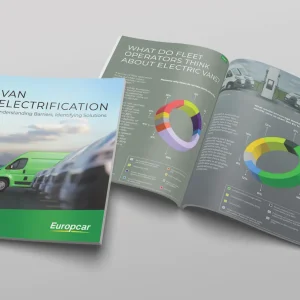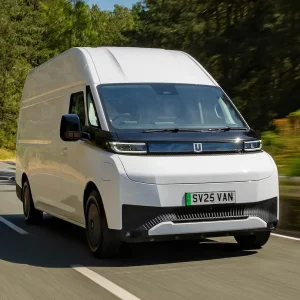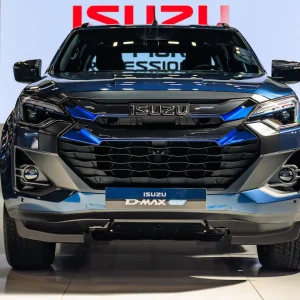 With a strong commercial vehicle heritage, Masterlease's UK roots go back to the 1960s and it's a major player in the contract hire market. Nowadays it's owned by global financial services giant GMAC. Last November saw General Motors, Vauxhall's parent, sell a majority stake in GMAC to an investment consortium led by Cerberus. So how many vans and trucks does Masterlease have on its books in Britain?
With a strong commercial vehicle heritage, Masterlease's UK roots go back to the 1960s and it's a major player in the contract hire market. Nowadays it's owned by global financial services giant GMAC. Last November saw General Motors, Vauxhall's parent, sell a majority stake in GMAC to an investment consortium led by Cerberus. So how many vans and trucks does Masterlease have on its books in Britain?
Over 15,000 and about 95 per cent of them are light commercials grossing at up to 3.5 tonne. Obviously our GM link means that we have a significant number of Vauxhalls, but Ford, Peugeot, Mercedes-Benz and Volkswagen are all heavily represented. Many of the vehicles we supply have extra equipment fitted; anything from a bulkhead or a crane to an onboard toilet.
What sort of services do you offer customers?
We can do anything from simply financing the acquisition of a vehicle and arranging its maintenance — including the upkeep of any equipment fitted — to providing risk, accident and fuel management services. We can arrange for drivers to be trained and check their licences too. Nor is everything we do necessarily linked with contract hire. We can put together a contract purchase deal, for instance — we offer rental too and interest in it is growing — and if a company wants to retain ownership of its vehicles, then we can put together a fleet management package. We can also advise customers on, for example, whether they need to fit and use a tachograph. We're regularly contacted by firms that give us the details of the goods they intend to carry, or the job they want to tackle, and ask us which vehicle would be the most suitable. The only things we don't do at present are provide drivers and warehousing.
Do most of your clients take the basic offer or do they tend to want at least some of the additional support you can provide?
There's a trend towards customers taking a more comprehensive package of value-added benefits.
 How far do accounting considerations influence the ways in which operators acquire their vans?
How far do accounting considerations influence the ways in which operators acquire their vans?
They do to a limited extent, but the words 'we've always done it that way and we'll keep doing it that way' carry a lot more weight. So then you have to suggest to the customer that he might like to try an alternative acquisition approach for some of his vehicles for a limited period. That way, he can compare and contrast the two solutions. We're always very keen to compare different approaches to funding with what the client is doing at present.
Why might a light commercial operator wish to go down the contract hire route?
If you suddenly win a three-year contract to deliver goods and you need 15 vans costing £15,000 each to handle it, then you're looking at a major capital outlay. There's also the risk that the contract may not be renewed. If you buy the vans and depreciate them over, say, ten years, then after three years you could find that you're stuck with a load of vehicles and no work. Buying vans also involves spending valuable management time sourcing them and trying to negotiate the best possible terms. More management time has to be spent organising maintenance — and maintenance has to be paid for, of course — and ultimately you'll have to arrange for the vehicles to be sold second-hand. Opting for contract hire takes away all these headaches and the duration of the agreement can be matched to the length of any contract you've taken on. You're free to concentrate on your core activities. If you're a small business in particular you have enough to do dealing with all the red tape you've got to comply with in order to be able to trade without having to become your own transport manager. What we're talking about is outsourcing; a very acceptable way of operating a transport fleet. You get the resources, but you lose the headaches.
Contract hire does mean that you get the use of the asset, but not its ownership. It has to be returned to the lessor at the end of the agreement, although at least that gives you the freedom to enter into another contract hire deal and instantly renew your vehicle line-up. Lessees often fear, however, that they'll be forced to pay for every minor scratch and stone chip when the vans are sent back, even though working commercial vehicles are almost bound to pick up blemishes. What attitude do you take towards such recharges?
We understand that they're working vehicles, we're not unreasonable in the charges we make, they're not onerous and we're always willing to adopt a flexible approach. If a customer is switching from outright purchase to contract hire, for example, then one thing we've started to do recently is inspect their current vehicles and make the assumption, judging by what we've seen, that they'll be in a particular state once they're reached a certain age and mileage. Then we tailor the acceptable return conditions and the rate the customer pays to suit. We're more than happy to put together a bespoke return conditions package. In one instance we've guaranteed to the client that no recharges will be levied. The cost of refurbishment is built into the rentals. They know where they stand and we know where we stand.
 Do you tend to avoid clients in industries that have a reputation for being especially rough on their vehicles? Builders for example?
Do you tend to avoid clients in industries that have a reputation for being especially rough on their vehicles? Builders for example?
Two of the biggest fleets on our books are in the construction industry — we have an established track record in that market — so the answer is 'no'. The only vehicles we don't actively look to take on are prisoner transfer vehicles and bullion vans because of the disposal difficulties associated with them. Incidentally, we're comfortable with dealing with any type of organisation, not just limited companies. I'm thinking about charities, local authorities and national government bodies, partnerships, sole traders, PLCs, multinationals… the lot.
Obviously projected mileage has a bearing on the size of the regular payments the client makes. What attitude do you adopt? Can the customer have a pooled mileage arrangement, for instance, so that those vehicles that have done more miles than expected are balanced out by those that have done less?
We can offer a variety of agreements. Mileage can be pooled quarterly, for example, or pooled over the duration of the contract. Clients can also enjoy 10 per cent latitude either way. All they have to do is say what they might be interested in looking at and we'll take a view as to whether we think it's a business opportunity. We have regular reviews with our customers where we will look at contract mileages and see which vehicles are over and which are under the projected figure. If necessary the agreement can be amended to reflect the developing situation.
Can contract hire agreements be extended?
Yes, for at least two years depending on the mileage.
Operators contemplating contract hire may worry that they'll be heavily penalised if they're obliged to return their vans before the agreement has run its course. What sort of penalties might they face?
They will incur some costs, but we would be foolish to clobber our customers immensely because if they thought we were going to do that, they wouldn't want to deal with us to begin with.
How are those costs calculated?
What we look at is the cost to us of having the vehicle returned early — any loss we may make if we have to dispose of it based on the difference between the market price and what it owes us — and we charge clients accordingly. What we won't do is sting them for a whole load of administration fees or for all the remaining rentals. What we may of course be able to do is transfer the vehicles to another customer and that will keep the charges down. Obviously we do everything we can to ensure this sort of situation doesn't occur in the first place and that can involve learning as much as possible about the client's business.
What can happen if you don't know enough about the firm's activities?
An example I can think of is a firm that specialises in electrical home appliances that was supplied with a considerable number of Ford Transit Connects. Eighteen months into a four year contract it decided to launch a washing machine; and it didn't fit into the back of the van. Had we been aware that this was going to happen we'd have advised it to opt for short-wheelbase Transit 300s instead. It would have looked a little bit like overkill for the first year-and-half, but would have made more sense in the long run.
Who services and repairs your vans?
Franchised dealers account for less than 15 per cent of our maintenance providers. We're quite happy to use independent service agents if they can provide the level of support that our customers demand.
Because you are major purchasers of vehicles, do you believe that manufacturers are more inclined to listen to you when you complain about a problem than they are to listen to a small operator with the same problem?
I would hope so. We employ an in-house team of people who spend their days dealing with rogue vehicles and hassling manufacturers to get faults resolved. We shouldn't need such a team, but we do. OK, sometimes manufacturers dig their heels in over, say, a warranty claim, but they all know we buy substantial numbers of vehicles every year; and if we walk away from a particular manufacturer, it's unlikely to be too happy about it.

 With a strong commercial vehicle heritage, Masterlease's UK roots go back to the 1960s and it's a major player in the contract hire market. Nowadays it's owned by global financial services giant GMAC. Last November saw General Motors, Vauxhall's parent, sell a majority stake in GMAC to an investment consortium led by Cerberus. So how many vans and trucks does Masterlease have on its books in Britain?
With a strong commercial vehicle heritage, Masterlease's UK roots go back to the 1960s and it's a major player in the contract hire market. Nowadays it's owned by global financial services giant GMAC. Last November saw General Motors, Vauxhall's parent, sell a majority stake in GMAC to an investment consortium led by Cerberus. So how many vans and trucks does Masterlease have on its books in Britain? How far do accounting considerations influence the ways in which operators acquire their vans?
How far do accounting considerations influence the ways in which operators acquire their vans? Do you tend to avoid clients in industries that have a reputation for being especially rough on their vehicles? Builders for example?
Do you tend to avoid clients in industries that have a reputation for being especially rough on their vehicles? Builders for example?



